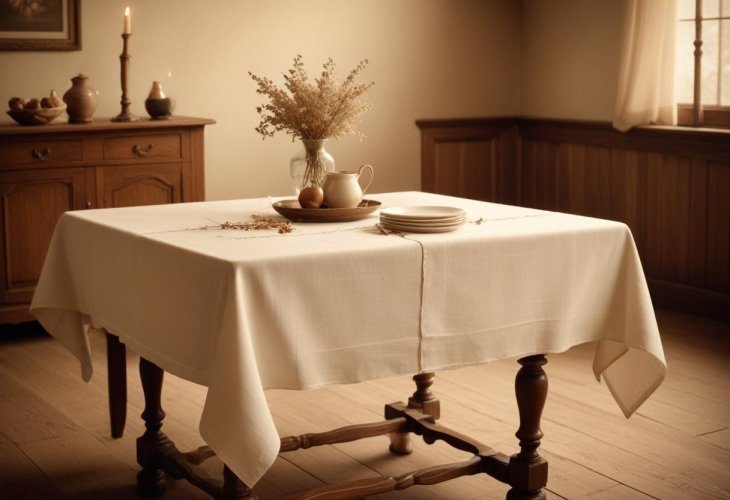The Silk Tablecloth: A Humble Lesson from Jerusalem's Past
Rabbi Pesach was puzzled and reflected on his actions. The old community of Jerusalem lived in poverty, in small apartments, sustained by minor trading or charity, with little more than a bed, table, and some vegetables in their homes...

"And Hashem spoke to Moses in the Sinai Desert." The sages say the Torah was given in the desert because it dwells with those who make themselves like a desert – simple, satisfied with little, humble. In today's world, it's hard to grasp the idea of being satisfied with little. Does it mean going abroad for just three nights instead of a week? Driving a simple car that's not an SUV?<\/p>
Even the simplest home today is filled with countless luxuries. But if we look back just a few years, we can start to understand what it means to be satisfied with little and apply it to our lives, to some extent, given our living conditions.<\/p>
A hundred years ago, a dear Jew, a renowned scholar named Pesach Trocker, lived in Jerusalem, having moved from Lithuania. He was a disciple of the Maggid of Wilkomir. Rabbi Pesach was dedicated to his mentor, accompanying him for midnight prayers at the Western Wall and studying Kabbalah with him at the Ruins of Yehuda HeChassid. One day, he noticed that his mentor's demeanor towards him had changed. Among their conversations, the mentor repeatedly cited the sages' sayings about humility, minimalism, and the virtue of acquiring the Torah by limiting pleasures.<\/p>
Rabbi Pesach wondered what had happened and began to review his actions. The old community of Jerusalem lived in poverty and scarcity, in small apartments. They earned a living from small trades or charity, and beyond a bed, table, and some vegetables, there was nothing in their homes... no sofas, no cupboards, no furniture, and often no closets. Clothes were kept in special boxes under the bed. Laundry was done in a tub in the yard. Can one even imagine such luxuries in these homes???<\/p>
One morning, the Maggid said to his student: When a person indulges in luxury, it can lead them away from their Creator. Rabbi Pesach couldn't hold back any longer and exclaimed: Rabbi! How much longer will you reproach me? What is my sin, and what is my transgression? The Maggid replied: Don't you know? During my visit to your home on Rosh Chodesh, I saw a silk tablecloth on your table. How can it be that a scholar owns such a luxurious tablecloth? Do you know what a desecration of Hashem's name that is?<\/p>
Rabbi Pesach replied: What do I have to do with buying tablecloths? Here is what happened: While I was in Lithuania, I hosted an elderly Jew for many years and refused to take money for this mitzvah, even though he was wealthy. After his death, he bequeathed the silk tablecloth from his table to me in his will, and a package with an explanation arrived at my home a few weeks ago. My wife did not want to accept such an expensive gift, but I said it was the deceased's wishes, and this would give him satisfaction, showing gratitude.<\/p>
The Maggid was still unsatisfied, so he went with his student to the rabbi of Jerusalem, Rabbi Shmuel Salant, to decide - is such a thing acceptable? A silk tablecloth on the table of a scholar? Rabbi Shmuel ruled that the silk cloth would remain on the table out of respect for the deceased, but a simple cloth would be laid over it...<\/p>
It's unbelievable. A century ago, a silk tablecloth was a matter for serious debate, a potential desecration of Hashem's name. What can we say today? How can we acquire the Torah amidst the abundant wealth surrounding us? Of course, we should not despair. In every generation, Hashem presents challenges and gives us the ability to overcome them. We are not required to revert to the conditions of Jerusalem a hundred years ago, but to serve Hashem as best we can in our time and place.<\/p>

